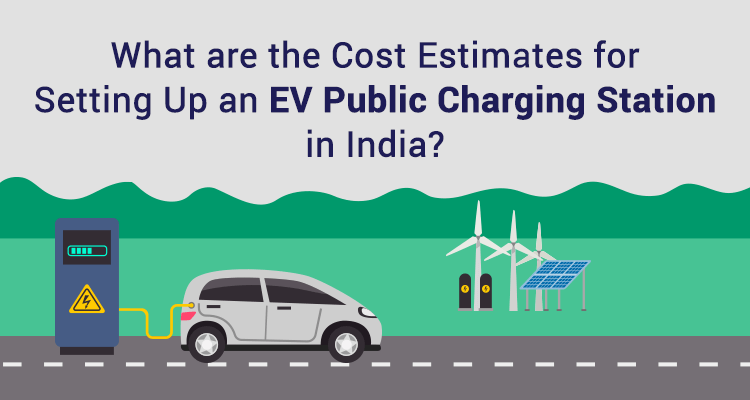What Are The Cost Estimates For Setting Up An EV Public Charging Station In India?

According to the Government of India, people are free to run electric charging stations in any part of the country (de-licensed) if they meet the power ministry standards. Consequently, you can build an electric vehicle charging station in India only if you meet the government's infrastructure requirements and choose the right location and charging solution provider. However, setting up charging stations required business financing.
However, you can apply for a business loan if you don’t have the necessary capital. One of the caveats to qualify for a business loan is to present the business plan and the subsequent costs and equipment involved. Furthermore, there are various other factors to consider before launching your EV public charging station and applying for a loan.
Types Of EV Chargers
Based on the level of charging they provide, electric chargers for EVs comprise three categories:
• Level 1 Charging (Slow Charging)
It is a primary device that charges slowly. Through an Alternating Current (AC) plug, it uses 120 volts and is compatible with home circuits. This equipment charges a battery for around 8 to 12 hours. Households use it to charge their electric vehicles overnight.
• Level 2 Charging (Standard Charging)
It requires 240 volts of AC power for charging and takes between 4 and 6 hours. The charger is compatible with all-electric vehicles, including plug-in hybrids. Parking lots, commercial properties, and residential buildings are the most common locations for these stations.
• Level 3 Charging (Rapid Charging)
A 480-volt DC plug can charge a battery up to 80% within 20-30 minutes. However, some EVs may not be compatible with it. Public charging stations are the only places to install them.
Government Guidelines for Establishing EV Charging Stations
The Indian government guidelines for setting up electric vehicle charging stations include the following.
• In India, electric vehicle charging stations are mandated every three kilometres in cities, every 25 kilometres on highways, and every 100 kilometres on heavy-duty highways.
• Under the guidelines of the Power Ministry of India, any individual can set up an EV charging station in India license-free.
EV Charging Station Infrastructure Requirements
EV charging stations require the following infrastructure.
• Safety equipment, substation equipment, and transformer installation.
• A set of 33/11 KV cables and the associated line and meter equipment.
• Civil works and installations.
• Space to charge vehicles and enter and exit vehicles.
• Installation of all chargers that comply with local and international regulations.
EV Charging Station Setup Costs
Two types of costs are involved in setting up an EV charging station:
• Infrastructural Costs
• Charger Costs
Sapna aapka. Business Loan Humara.
Apply NowEV Charging Station Infrastructure Costs
Infrastructural costs include land, facilities, and equipment required for a charging station.
| Requirement | Cost |
| Monthly rent of INR 50,000 for a land lease | Rs. 6,00,000 |
| Transformers, energy meters, and electricity connections | Rs. 7,50,000 |
| Civil Works | Rs. 2,50,000 |
| Team responsible for maintenance and technical support | Rs. 3,00,000 |
| Increasing brand awareness and marketing | Rs. 50,000 |
| Total | Rs. 19,50,000 |
Note: The above figures are estimates. There may be differences based on the time and place.
EV Charging Station Charger Costs
Public EV chargers must have at least three fast charging stations (DC) and two slow charging stations (AC), per government guidelines. Comparatively, Level 1 chargers cost less than Level 2 and 3. Below is a list of the costs for different chargers.
| Type of Charger | Cost |
| Bharat DC – 001 | Rs. 2,47,000 |
| Bharat AC – 001 | Rs. 65,000 |
| Type 2 AC | Rs. 1,20,000 |
| CCS | Rs. 14,00,000 |
| CHAdeMO | Rs. 13,50,000 |
EV Charging Station Franchise in India
The following companies provide EV charging station services.
• Exicom Power System – Gurgaon
• EVQ Point – Bengaluru
• Tata Power – Mumbai
• Charge My Gaddi – Delhi
• Charge + Zone – Vadodara
• PlugNGo – Noida
• Dyna Hi-tech Power Systems – Navi Mumbai
• Volttie – Noida
Benefits Of Setting Up EV Charging Stations
Setting up an EV charging station has many benefits.
• Electronic vehicles are becoming more prevalent in India. Electric vehicles will replace Internal Combustion Engine (ICE) vehicles in the coming years. Therefore, EV charging stations will be in high demand.
• To encourage the installation of EV charging stations, the government provides a variety of schemes and subsidies.
• A charging station for electric vehicles is inexpensive, and revenues would grow over time.
• Through EV charging stations, India can implement its 'Go Green’ initiative.
Get Business Financing From IIFL Finance
Do you want to set up your EV charging station but need funds? IIFL Finance can help. Visit our website and apply for a business loan. With our competitive interest rate and features tailored to your needs, it's easier than ever to get a business loan.
FAQs
Q1. What is an EV charging station?
Ans. The purpose of an EV charging station is to provide charging points for electric vehicles.
Q2. Can EV charging stations be set up at home?
Ans. Yes. It is possible to set up an EV charging station at home. Ensure that you arrange charging points and cables with your electrician.
Sapna aapka. Business Loan Humara.
Apply NowDisclaimer : The information in this blog is for general purposes only and may change without notice. It does not constitute legal, tax, or financial advice. Readers should seek professional guidance and make decisions at their own discretion. IIFL Finance is not liable for any reliance on this content. Read more



